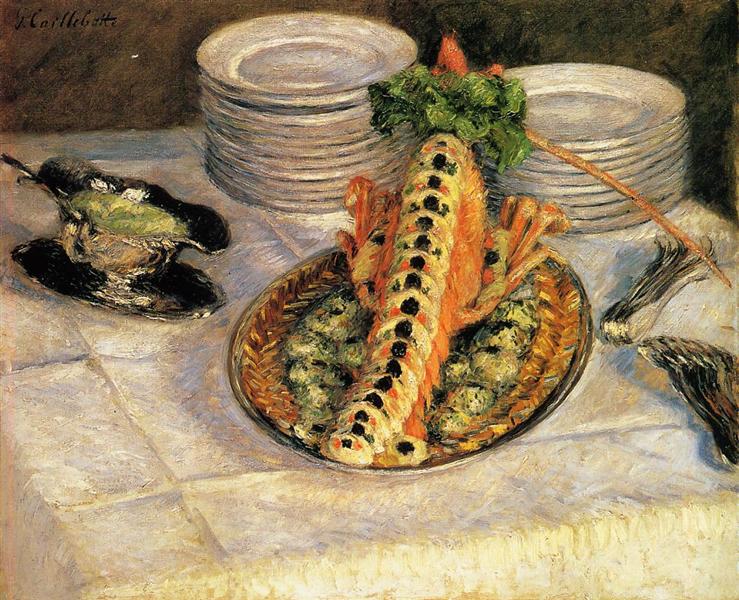Description
Gustave Caillebotte's Still Life with Crayfish (1882) is a prime example of the author's talent for capturing the essence of the natural world and everyday life through the technique of realism. This painting, which effectively features in his still life war, departs from the more common themes of the time in favor of an approach that pays close attention to the texture, color, and composition of the elements presented.
The composition of the work is notable for its carefully structured organization. On the table we see an array of crayfish, which, arranged almost in a dance, occupy a central place in the painting. Their bright red colors stand out against the duller, earthier background, which gives them an indisputable prominence. Caillebotte does not limit himself to depicting the figure of the crab superficially; he delves into the lighting and shadows that play on its surface, achieving an almost three-dimensional representation that seems to come to life before the eyes of the viewer.
The use of colour in this work is another of its most fascinating features. The palette chosen by Caillebotte is rich and varied, with warm tones evoking a sense of proximity and familiarity. The brushstrokes are energetic and precise, suggesting a mastery of technique when working with oil. The way the artist captures the light reflecting off the surface of the crabs is particularly impressive, adding a level of realism that resonates deeply with the viewer.
It is essential to mention that, although the painting does not include human figures or characters that interact directly with the setting, it breaks into the representation of a moment of everyday life. In this sense, the work echoes the philosophy of Impressionism, although Caillebotte, as part of the group, distances himself in his approach by focusing more on textures and less on the fleeting light that characterizes many of the works of his contemporaries.
Gustave Caillebotte, renowned for his groundbreaking works and contributions to Impressionism, was also a noted art collector and lover of photography. His technical training and appreciation of perspective are evident in the way elements are arranged in the work, displaying his keen attention to detail and the environment in which life unfolds.
Still Life with Crayfish falls within a larger body of work that examines the relationship between humans and their environment, using still life as a vehicle to explore this duality. Similarities can be seen in other works from the same period, such as those by Édouard Manet and Henri Fantin-Latour, who also addressed the elegance and beauty of everyday objects, but few did so with the same technical precision as Caillebotte.
In conclusion, this painting not only illustrates Gustave Caillebotte's technical mastery, but also invites reflection on the simplicity of everyday life, revealing the extraordinary beauty that can be found in the most ordinary of items. His ability to capture this essence is what makes "Still Life with Crayfish" a standout work in art history, a testament to the skill and creativity of an artist who continues to fascinate contemporary audiences.
KUADROS ©, a famous painting on your wall.
Hand-made oil painting reproductions, with the quality of professional artists and the distinctive seal of KUADROS ©.
Painting reproduction service with satisfaction guarantee. If you are not completely satisfied with the replica of your painting, we will refund 100% of your money.

